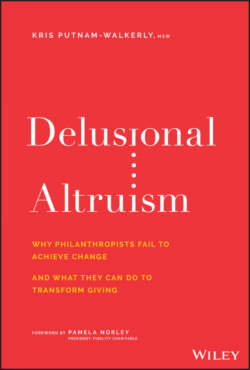Читать книгу Delusional Altruism - Kris Putnam-Walkerly - Страница 7
Foreword
ОглавлениеIt's fitting that I first met Kris Putnam-Walkerly at a Points of Light Foundation Board retreat in the fall 2018, where I was moderating a panel on which she was speaking. Points of Light is a nonprofit that seeks to inspire, mobilize and equip people to effect change through volunteerism and service to others—a description that also fits Kris perfectly. She's been advising as a global philanthropy expert for more than 20 years, sharing her deep domain knowledge to help ultra-high net worth donors, funders using donor-advised funds, foundations and Fortune 500 companies make a significant impact for worthy social causes through charitable giving.
From the start of our relationship, I was impressed with Kris' profound insights on the sector, particularly as they relate to the concepts of Delusional Altruism discussed in this book, which commonly plague well-intended philanthropists. These delusional or misleading thoughts and approaches—which often see givers focused on the wrong questions, assigning themselves too many steps or feeling too overwhelmed to even take the next step—hinder their ability to maximize impact in their giving.
Kris' philosophies on overcoming these challenges mirror many of those that I share as president of Fidelity Charitable, an independent public charity that has helped donors support more than 220,000 nonprofit organizations with over $40 billion in grants since 1991. In different capacities, we ultimately strive for the same goal: to drive a higher level of satisfaction and effectiveness in our donors' philanthropy.
One of the biggest hurdles I see hindering this goal in philanthropy, and one of the many provocative ideas that Kris discusses in this book, is the misconception among donors that nonprofit organizations must be frugal in investing in infrastructure. This generally misinformed mindset holds that nonprofits spending the least on overhead deliver the greatest value to the people they serve. That may be the case, but often may not.
As Kris explains, this scarcity mindset is rooted in fear of failure rather than fact. It holds back well-intended people from pursuing their philanthropic goals. Like Kris, Fidelity Charitable subscribes to an abundance mentality when advising donors on worthwhile nonprofits, believing that the more an organization invests into the infrastructure driving their mission, the more long-term, sustainable results they'll generate for their social cause.
Think about it in the context of an organization trying to feed hungry children. A donor operating under a scarcity mindset narrowly focuses on ensuring the funds supporting the organization's infrastructure don't outweigh the funds needed to purchase and distribute food. Thus, if the organization is spending money on administrative overhead, the donor believes it's not properly allocating funds.
In my experience, this is a short-sighted understanding of what it takes to support a truly effective nonprofit organization and create social change. In fact, the organization may be more successful in its objective of aiding hungry children if it is able to attract and retain top talent to aid in its mission, thanks to donor support. Support for state-of-the-art technology could help it deliver more food more efficiently. Support for the nonprofit to advocate for policy changes might give more families the resources they need to feed their children without outside assistance.
Like any successful organization in the private sector, healthy nonprofits also need to invest in people, innovation, systems, and technology to drive productive action, as Kris details. Providing funds to support and train top talent and equipping them with the best tools and resources to do their jobs not only ensures they can effect change in line with the nonprofit's mission—but likely do so more efficiently, and at a greater capacity, than a spartan organization with little means to achieve an end.
I find that this concept of abundance mindset, that you must support an organization itself to support the realization of its mission, is easy to grasp once explained. And yet, comprehension and understanding in the philanthropic sector takes time—the commodity our society seems to be lacking most.
Kris' straightforward, easy-to-read guidance within these pages helps you identify and conquer delusions that may be holding you back from making a measurable social impact through altruistic efforts. These are critical ingredients to making confident, informed decisions to lead a nonprofit or see your charitable contributions put to good use. This book is a rewarding investment for any reader interested in reexamining and changing how you give to accomplish the greatest impact for a cause you're passionate about.
Practical idealists, you must read on.
— Pamela Norley, President, Fidelity Charitable
